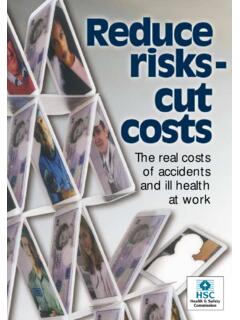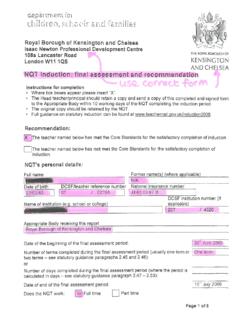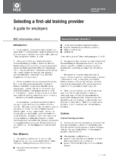Transcription of Is it legal? A parents’ guide to the law
1 RESEARCH & POLICY FOR THE REAL WORLDIs it legal ? a parents guide to the law3rd Edition Is it legal ? a parents guide to the law1We live our lives within the law reflects the attitudes and beliefs of society. From employment to welfare legislation, people generally accept that the law is there to protect them, act as a balance and check against exploitation and wrongdoing and make sure justice is the years, the law has become more complicated and more involved in different areas of people s lives. Sometimes the law can be seen as meddling and intrusive, particularly in areas of private life; there has to be a balance between people s right to live as they wish and the right of the law to intervene on behalf of society. This balance between the needs of society and people s individual rights applies to families. In the past parents claimed the right of ownership over their children, arguing that family life was a private matter. But nowadays few would argue in favour of young children being sent up chimneys, or put to work in factories or the mines from five years old.
2 No-one would question the need for laws that protect children from cruelty, even from their parents . In family life, the absolute power of parents over children has been replaced by an interweaving of law, custom, judgement and negotiation. It makes for a potentially more democratic and healthy family, and society, but at times it can be confusing and frustrating for parents . Law-makers, too, can feel frustrated at the limits of law to affect and change family life and booklet is for parents and carers. Its aim is to help them know when the law has something to say about their families day-to-day lives. Equally important, it helps them know the limits of the law. It is a reminder that whilst law permeates parents and children s lives to an unprecedented degree, it must work alongside parents to foster healthy and effective families. For it is families who raise children, helping and guiding them to booklet was first published in 2000. This third edition covers the law in England and updates and expands information on a range of issues.
3 However, it cannot provide a complete list of all the legal issues relating to parenting. It is not about when the law has to step in on major issues, for example, adoption, fostering, child protection, children in care or The law and family life 21 What the law says about parents and children 42 Is it legal Frequently asked questions 83 Home life 114 At school 155 Out and about 216 Growing up 277 Children in trouble 328 Balancing parenting and employment 369 Partners and parents 43 Helpfile 50 ContentsThis booklet should not be used as a substitute for expert legal advice for any of these or other specific situations. parents with a particular query should refer to the helpfile at the back of the booklet for a list of organisations to contact. There is also information on getting in touch with a October 2007 Family & Parenting InstituteFamily & Parenting Institute2Is it legal ? a parents guide to the law3 legal adviceFinding a good solicitor is not always easy.
4 Choose a solicitor in the same way as you would choose any other service by shopping around. Find one who specialises in your area of concern. Many solicitors offer an initial interview free or at a cheap rate, and will advise you if you have a case. Always ask what their fees are. legal aid has been replaced by the Community legal Service Fund. For a directory of solicitors who offer this service, look at is a parent?That sounds like an easy question to answer, but it isn t necessarily. Being a parent in law is not always the same as being the biological parent, being on the birth certificate, raising or loving a child. In the majority of cases, a child s biological parents have the rights and responsibilities of parenthood as set out in many different laws in England and Wales. But sometimes the court may take over the responsibility of deciding who should look after a child, for example, children who go to live with foster parents , or in residential homes or who are law on parents and children s rights and responsibilitiesThere are some important Acts that try to define the different rights and responsibilities of parents towards their children.
5 The law in England and Wales used to talk of a parent having rights and duties , but in recent times, the language has changed to one of parents having responsibilities and parents rights being balanced by children s Children and Young Persons ActThis important Act imposes criminal liability for the abandonment, neglect or ill-treatment of any children under 16 years old by anyone over 16 years old. This responsibility cannot be transferred, so a parent is still liable even, for example, if a babysitter hurt or neglected the child. The adult must be shown to have wilfully assaulted or neglected the child, or acted in a manner likely to cause unnecessary suffering or injury to health of the parent is guilty of neglect if they do not ensure that the child has food, clothing, health care and Children ActThis Act was a landmark law, redefining the relationship between parent and child. It changed the previous emphasis from one of duty and rights of the parent to one of responsibilities.
6 The Act uses the concept of parental responsibility to describe the rights, duties, powers, responsibilities and authority parents have for their child. In this Act, a child is a person under the age of law and family lifeFamily & Parenting Institute4Is it legal ? a parents guide to the law5 Parental responsibilityParental responsibility means being responsible for:l Your child s wellbeingl Looking after your childl Feeding and clothing your childl Making decisions about their schoolingl Deciding whether to consent to medical treatmentl Representing them in legal proceedingsl Making decisions about where to livel Making decisions about their religious law sets out who has parental responsibility. You have it automatically if you are:l The biological mother of the childl The biological father of the child, and were married to the mother at the time of conception or birth, or you married the mother after the birth of the child or, for babies born since 2003, you registered the birth of the baby with the motherl You are adoptive parents once an adoption order is if the marriage breaks down, both father and mother will continue to have parental responsibility.
7 Unmarried fathers did not have the same rights and responsibilities as a married father. The Adoption and Children Act 2002 now gives an unmarried father parental responsibility where he and the mother register the birth of their child together. Even if the unmarried father s name is not on the original birth certificate, you can now re-register the birth at a later date, adding the father s details. This will give the father parental responsibility. See But the Act is not retrospective, so unmarried fathers with children born before 1 December 2003 can still only get a parental responsibility agreement, either by:l Making an agreement with the motherl Or by applying to the court for a parental responsibility couples wishing to obtain a parental responsibility agreement have to:l Obtain a form from a solicitor or family courtl Go in person to the local magistrates court or County Court to get it signedl Send it to the Principal Registry of the Family should note also that an unmarried father who has not got parental responsibility will have to apply for a court order to obtain the right, if the mother Act 2004 This was a very important new Act which brought in the re-organisation of all the services in Local Authorities (LA) that provide help for children in their area, under a government programme called Every Child Matters.
8 The aim is to improve the wellbeing of children in the LA so that every child can:l Be healthyl Stay safel Enjoy and achievel Make a positive contributionl Achieve economic wellbeingEducation, health and social services for young people, and the youth justice system are no longer totally separate sectors in the LA. They now have a duty to co-operate together and to share information about children in their care with other professionals, in order to safeguard and promote the welfare of all 1 What the law says about parents and childrenFamily & Parenting Institute6Is it legal ? a parents guide to the law7children. To ensure that all parts of the children s services work together to provide joined up help for children, each child will have a unique file in a database so that if anything goes wrong, each professional knows what the other is doing for the child. By 2008, each LA will have appointed a Director of Children s Services to ensure that the ideas behind this programme are being fully carried out.
9 By the summer of 2006, 80 per cent of LAs had made this re-organisation. The Act also places a duty on LAs to promote in particular the educational achievement of looked after children. At the same time as this Act came in, the government published proposals for earlier help for families having problems caring for their children, to try and prevent children being taken into Act also established a Children s Commissioner for England (they had already been established in Scotland, Wales and Northern Ireland), to promote the interests of children up to the age of 18, and up to 20 in the case of looked after children and those with learning difficulties. The Commissioner cannot investigate individual cases, but if they think that there is a particular unfair or unjust situation, in a children s home, which raises questions that apply generally, then they can hold a full inquiry and make recommendations to the government to change their policy. It is their job to see that the aims of the Every Child Matters programme are carried Act 2006 This Act is the first Act to deal solely with early years and childcare.
10 It is expected to come into force in 2008. It gives LAs new duties, which include:l A duty to improve pre-school development and learning from birth to five and to reduce inequalities in pre-school children. The Act sets up the Early Years Foundation Stage of learning for pre-schoolers and provides better access to childhood services by setting up children s centres, often at schools. l A duty to provide information and advice , and sufficient childcare for all working parents in the LA, especially those with disabled children and those on lower Making sure that all childminders and other professionals caring for children up to the age of five, and after school ( in after schools clubs) up to the age of eight are registered, and that they are inspected by Human Rights ActThe Act (which came into effect in 2000) puts some basic human rights into UK law, based on the European Convention on Human Rights. The Act says that people of all ages, including under 18s, have a right to be protected from inhuman and degrading treatment, and a right to respect for their private and family life.

















